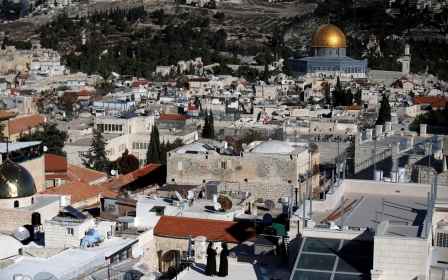Prophecies and politics: How US evangelical Christians pushed for Jerusalem move
God is not a real estate agent, the former bishop of Jerusalem said in response to US evangelical support for recognising Jerusalem as the capital of Israel.
Evangelical advocacy for Israel is a political position rooted in theology, experts say.
President Donald Trump went against the advice of allies and warnings of foes and announced on Wednesday plans to move the US embassy in Israel to Jerusalem. The US religious right was a driving force behind the move, which left Washington isolated on the world stage, analysts say.
"I have no doubt that evangelicals played a meaningful role in this decision," Johnnie Moore, a spokesperson for My Faith Votes, a large evangelical political group, told Reuters.
The policy shift was an unprecedented move that garnered international and domestic condemnations, even from states and politicians that are friendly to Israel.
You’re belittling almighty God, making him a real estate agent, favouring one party over another party
- Riah Abu El-Assal, former bishop of Jerusalem
While leading Christian figures across the world have opposed Trump’s decision, the US religious right’s influence helped make it a reality.
Several Christian groups had issued statements and action alerts to push for recognising Jerusalem as Israel’s capital.
East Jerusalem was illegally occupied by Israel in 1967 and annexed in 1980. The status of the city, which is home to holy sites for all Abrahamic faiths, remains disputed. The recent US decision angered Palestinians, Arabs and Muslims, sparking protests across the world.
'Belittling almighty God'
US evangelical political activists view the Israeli-Palestinian conflict through a biblical lens. In their interpretation, the scripture promises Jerusalem to the Jewish people for all time. They cite a verse from the Books of Chronicles that quotes God as saying: “I have chosen Jerusalem that my name may be there and I have chosen David to be over my people Israel.”
A wider theological aspect of the evangelical support for Israel stems from the fundamentalist notion that the establishment and preservation of Israel as a Jewish state will hasten the second coming of the Christian messiah, Jesus Christ.
"Jerusalem has been the object of affection of both Jews and Christians down through history and the touchstone of prophecy. But most importantly, God gave Jerusalem - and the rest of the Holy Land - to the Jewish people," Robert Jeffress, an evangelical preacher who advises the president, told CNN.
But the idea of God choosing a certain people and giving them a piece of land is insulting to his divine qualities, argued Riah Abu El-Assal, former Anglican bishop of Jerusalem.
“You’re belittling almighty God, making him a real estate agent, favouring one party over another party,” he told Middle East Eye.
Ron Stockton, a political science professor at the University of Michigan-Dearborn, said Christian Zionists who base their support for Israel on the Bible believe that the creation of Israel in 1948 was the fulfilment of a divine prophecy.
The professor added that by going through with the move Trump was able to please the Israeli lobby and “evangelical culture”, while appearing to be a strong president who keeps his campaign promises.
Laurie Cardoza-Moore, the founder of Proclaiming Justice, a pro-Israel evangelical organisation, said the bible, which she called the true word of God, clearly states that Jerusalem is the undivided capital of the Jewish people.
“The evangelical vote is a very powerful vote in the United States of America,” she told MEE. “Everybody recognises that. And yes, it has been the evangelical Christians who have been pushing this (embassy) move.”
In their quest to shape policy, evangelicals found an unlikely ally in Trump, a casino mogul who does not appear to be driven by spirituality.
Even after the infamous video of Trump bragging about grabbing women’s genitals was leaked, the Christian right firmly stood behind the Republican candidate, with 80 percent of white evangelical voters backing him November 2016, according to exit polls.
Conservative Christians placed their bet on the winning candidate and now their gamble is paying off. From banning transgender people from serving in the military to appointing conservative judges, the president has been pushing the religious right’s agenda, reversing the tides for the cultural war that conservatives seemed to be losing to secularism and liberal values.
The embassy move, however, embodies far-reaching international consequences, and evangelicals are taking credit for it.
'Inflammatory and discriminatory'
Desmond Tutu, South African Nobel laureate and the archbishop emeritus of Cape Town, strongly condemned the US policy shift.
"God is weeping over President Donald Trump’s inflammatory and discriminatory recognition of Jerusalem as the capital of Israel," Tutu, an outspoken advocate for Palestinians, said.
Pope Francis also voiced opposition to the move, saying he could not remain silent.
Whenever people think that God has given them something, historically that has led to very unpleasant consequences
- Jim Rigby, pastor
“And at the same time, I wish to make a heartfelt appeal to ensure that everyone is committed to respecting the status quo of the city, in accordance with the relevant resolutions of the United Nations,” he told a general audience on Wednesday.
Palestinian Christians inside Jerusalem itself had called on Trump not to go through with the move.
“We are certain that such steps will yield increased hatred, conflict, violence and suffering in Jerusalem and the Holy Land, moving us further from the goal of unity and deeper toward destructive division,” Christian Orthodox archbishops wrote in a letter to the US president on Tuesday.
Palestinian groups and churches have long opposed attempts to use the Christian faith to justify the occupation.
“We declare that the military occupation of Palestinian land constitutes a sin against God and humanity. Any theology that legitimises the occupation and justifies crimes perpetrated against the Palestinian people lies far from Christian teachings,” reads the mission statement of Kairos Palestine, a Palestinian movement that calls on Christians worldwide to help end the occupation.
Asked why American evangelicals seem indifferent to the suffering of Palestinian Christians, Bishop El-Assal said: “Because many in the Christian communities in America do not realise that there are Christians among the Arabs.”
El-Assal added that he has had first-hand experience of that misconception - being asked by Americans about his conversion to Christianity when they find he is a Palestinian Christian.
US vice president Mike Pence will visit Israel and the Palestinian territories on 17 December. Trump mentioned the trip after announcing the embassy decision.
Pence is a leading figure in the evangelical conservative movement. "My support for Israel stems largely from my personal faith," Pence told the Congressional Quarterly in 2002, when he was lawmaker.
Palestinian officials have said that the US vice president is not welcome in Palestine.
Hanan Ashrawi, a leader in the Palestinian Liberation Organisation who is Christian herself, warned Pence against making biblical talking points. She told BBC that God did not command that the world has to be unjust for the Palestinians.
"If he wants to talk politics, legality and morality, fine, he will find people. If he wants to come and tell me: 'It's ordained, this is what the Bible told me,' then I think he should go preach in a church, rather than talk politics."
Egypt's Coptic Christians Pope Tawadros II also cancelled a planned meeting with Pence.
However, Cardoza-Moore, the evangelical activist, questioned the spiritual foundation of Christian leaders who opposed the embassy move, going as far as calling them “false prophets.”
She challenged Christian preachers who came out against recognising Jerusalem as the capital of Israel to point to verses from the bible that would substantiate their position.
“It’s actually a sin against God what these people are teaching and preaching - to suggest that Jews have no right to this city,” Cardoza-Moore told MEE.
“You have to also remember that in the Middle East, Christians are Arab; their culture is more Arab leaning than it is central to their faith.”
Jim Rigby, the minister of St Andrew's Presbyterian Church in Austin, Texas, said literal interpretations of spiritual writings should not drive policy.
“Whenever people think that God has given them something, historically that has led to very unpleasant consequences,” he told Middle East Eye.
“Sane religion doesn’t think like this. It doesn’t say: ‘I found something in an ancient book that I’m now going to use to trump any question of justice or sanity.’”
This article is available in French on Middle East Eye French edition.
Stay informed with MEE's newsletters
Sign up to get the latest alerts, insights and analysis, starting with Turkey Unpacked
Middle East Eye delivers independent and unrivalled coverage and analysis of the Middle East, North Africa and beyond. To learn more about republishing this content and the associated fees, please fill out this form. More about MEE can be found here.





